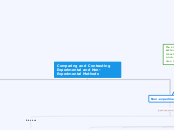The strengths of using a non-experimental method is that it often does not requier to interfere with the study. The weaknesses of a non-experimental methods is that it could also lead to ethical misconduct.
The strengths of using Experimental methods is that researchers would have control over the many variables they wish to use. Better results will come out since the environment is under strict conditions.
The weaknesses of using experimental methods is that there could be an error in trying to conduct the experiment and will affect the results. Another weakness could be that you can not conduct the experiment due to ethical reasons.
The non-experimental method can be used when trying to create a hypothesis that can be tested further later on.
The experimental method can be used when trying to determine if you change one variable, if it will affect the other. In other words, a cause-and-effect relationship.
Comparing and Contrasting Experimental and Non-Experimental Methods
Non-experimental methods
Qualitative research
Observation
Covert
In a covert observation, people know they're
being watched by the researcher. Participant
observations can be done covertly or overtly
as well.
Overt
In a covert observation, people are aware
that they are being watched by a researcher.
Naturalistic
In a naturalistic observation, they often occur
in natural settings.
non-participant
Non-participant observations is where the researcher is not part of the group that they are observing.
Case study
Participant
In a participant observation, the researcher is
involved in the group being observed.
Interviews
Types of Interviews: Unstructured Interviews and semi-structured interviews. An unstructured interview is where there are no questions planned out before the interview is conducted. A semi-structured interview sounds like and informal conversation where the set of questions allows people to answer freely.
Experimental methods
Natural experiments
A natural experiment is where researchers
no control over the variables. Everything is
occuring and they are already there to be
studied.
Field expirements
A field experiment takes place in a natural environment,
but researchers still manipulate the variables. Participants
don't often know that they are in an experiment.
Laboratory expirements
Lab experiments are conducted in special environment
where the variables (IV,DV) can easily be controlled.

